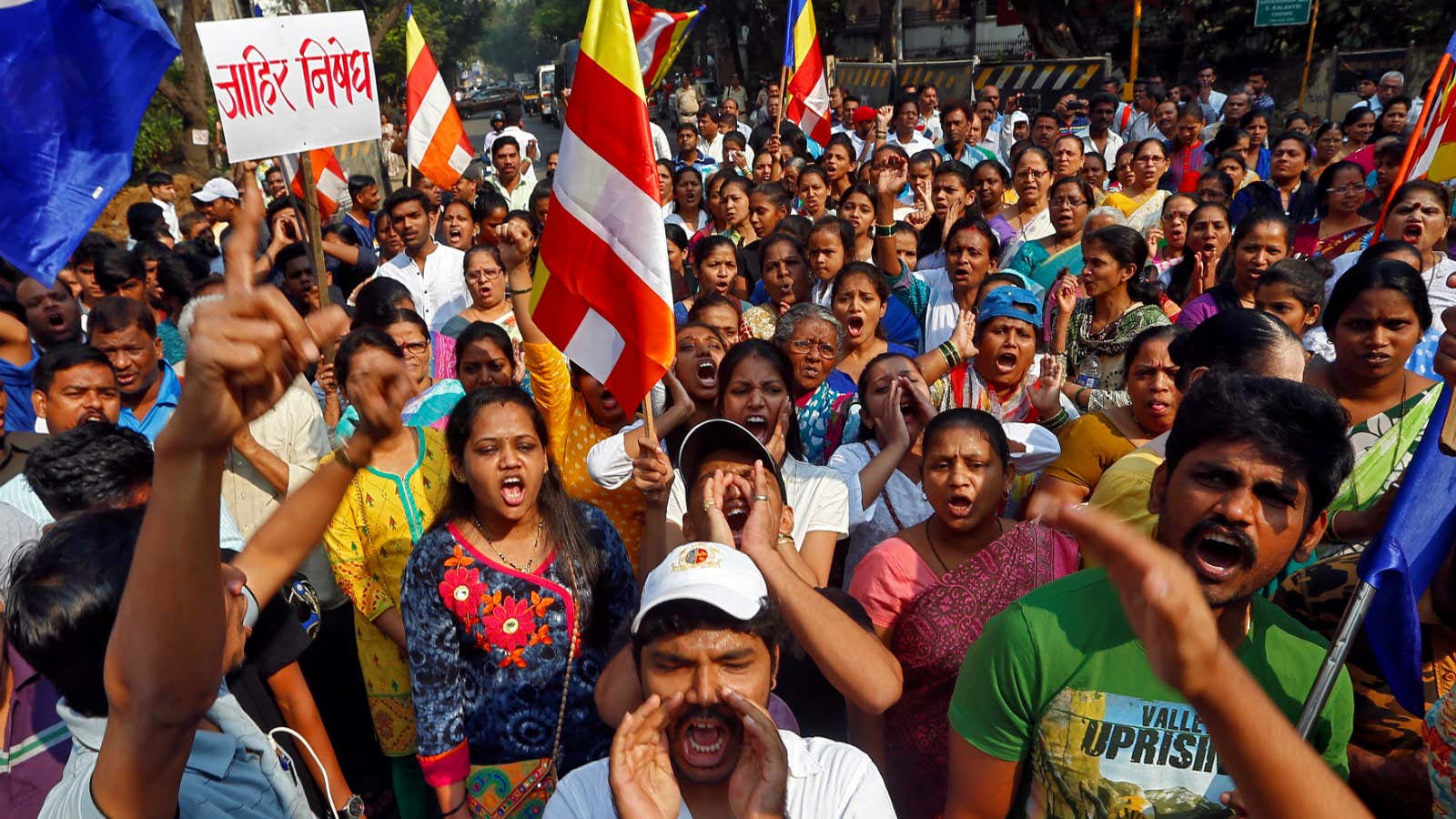Indian police have arrested five prominent left-wing activists, accusing them of abetting a caste-related clash in the western state of Maharashtra earlier this year.
On Aug. 28, teams of Pune police from Maharashtra searched the residences of Sudha Bharadwaj, Gautam Navlakha, Arun Ferreira, Vernon Gonsalves, and Varavara Rao, among others, across Delhi, Mumbai, Hyderabad, and Faridabad.
The activists, who the police say have Maoist links, have been accused of instigating the Jan. 01 violence at Bhima Koregaon near Pune. Some of the persons arrested on Aug. 28 are, in fact, themselves fighting in court for those held in an earlier series of arrests made in connection with the same case. Others include senior civil rights lawyers, journalists, poets, and trade unionists.
The raids and arrests have sparked renewed concerns over the process of justice in India, and the state of freedom of expression and dissent. Especially since the police have used India’s draconian anti-terrorism law, the Unlawful Activities (Prevention) Act, which allows for the detention of the accused for up to six months without any charges, and up to 30 days in police custody.
“Today’s arrests (are) the second of such crackdown on rights activists, advocates and journalists who have been critical of the state,” Aakar Patel, executive director of Amnesty International India, said in a statement. “All these people have a history of working to protect the rights of some of India’s most poor and marginalised people.”
Authorities, however, say the due process has been followed.
“We have made these arrests on the basis of incriminating evidence collected during our investigations and the documents recovered from the five activists arrested on June 06. The names of those arrested today figure in these documents,” Pune joint commissioner of police Shivaji Bodkhe told The Times of India newspaper.
The battle of Bhima Koregaon
On Jan. 01 every year, hundreds of thousands of people from the Dalit community—deemed untouchable till the practice was banned in 1955—gather to commemorate the 1818 Battle of Koregaon.
In that battle between the British East India Company (EIC) and the local Maratha ruler, Peshwa Baji Rao II, one of the key groups that helped the EIC win was the Dalit caste of Mahars. With the Peshwas belonging to the Brahmin caste, the highest in the traditional Hindu social hierarchy, the battle even now carries a strong social subtext.
In 1927, BR Ambedkar, who later prepared the Indian constitution, first visited the site on the 109th anniversary of the battle to highlight the role of Dalits in the armed forces. Ever since, the Jan. 01 event has evolved into a sort of quasi-pilgrimage for a section of one of India’s most marginalised social groups.
This year, though, the celebrations evoked protests from right-wing Hindu nationalist groups, who reportedly waved saffron flags and pelted stones at the marchers. In the ensuing melee, one person died and several were injured. Soon, Dalits were protesting in other parts of Maharashtra and it was weeks before normalcy returned.
The coin flips
Initial reports said that right-wing leaders had triggered the Jan. 01 conflict with anti-Dalit speeches and stone-pelting on the celebrations. The Pune police even filed cases against two key leaders accused of instigating the violence: Milind Ekbote, chief of the Hindu Ekta Manch, and Sambhaji Bhide, head of the Shiv Pratishthan Hindustan.
However, while Ekbote was quickly released on bail, Bhide, whom prime minister Narendra Modi considers his guru, was not even arrested.
On June 06, the case took a curious turn when the police arrested a few activists from Mumbai, Nagpur, and Delhi in connection with a Dec. 31, 2017, event held in Pune. At this event, Elgaar Parishad, the arrested persons were alleged to have instigated the next day’s violence at Bhima Koregaon. The police also dubbed these activists “urban Maoists.”
Political overtones
The state of Maharashtra is ruled by the Hindu nationalist Bharatiya Janata Party (BJP) which also heads the government of India under Modi. The BJP has for long viewed left-wing activism with suspicion. The political overtones turned stark after Rahul Gandhi, president of the opposition Indian National Congress, tweeted on Aug. 28 in the wake of the arrests:
The RSS, or the Rashtriya Swayamsevak Sangh, is the ideological mothership of the BJP.
